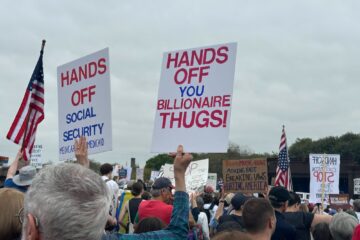This was the display in my nearby Tesco grocery store.
Major newspapers across the UK today are all on the same page for once. Specifically, their front covers, which feature the same campaign imagery protesting government proposals that could eviscerate copyright protections against artificial intelligence. Brits popping into their local store or newsagents will be greeted by a spread of bright blue pages demanding the same thing: MAKE IT FAIR.
Creative and media industries have teamed up on this “Make It Fair” initiative, calling for readers to help protect British creative industries. The campaign was created to fight government proposals that would allow artificial intelligence companies to train their models on copyright-protected work without permission.
The stunt appears to be carefully timed. A public consultation period — in which anyone can submit their opinions to the UK government — closed today following its launch on December 17th, proposing that exceptions be made to copyright law regarding AI training “for any purpose,” including commercial. Creatives would be able to opt out of the new “text and data mining” process via a so-called “rights reservation” process, but that places greater responsibility and labor requirements on individuals to ensure their works are protected.
“Tech companies use creative content, such as news articles, books, music, film, photography, visual art, and all kinds of creative work, to train their generative AI models,” reads the campaign website hosted by the News Media Association (NMA). “Publishers and creators say that doing this without proper controls, transparency or fair payment is unfair and threatens their livelihoods.”
Members of the NMA trade body include The Sun, Daily Mail, Daily Mirror, and the Guardian, alongside regional print and digital outlets across the UK. The Make It Right campaign is also backed by the Creative Rights in AI Coalition, described as a “broad group of rights holders, AI businesses, and organizations” seeking to ensure that creatives are protected and fairly compensated under generative AI regulations.
The government’s proposals have been widely criticized over concerns that weakening copyright protections and letting AI companies gobble up whatever data they please could have a devastating impact on the UK’s $152 billion creative industry. The Make It Fair campaign is one of several pushbacks that have rolled out today in protest, including a silent album called “Is This What We Want?” released by more than 1,000 musicians, including Kate Bush and Damon Albarn.
“The ‘Make It Fair’ campaign opposes the government’s proposal in its consultation to weaken copyright law and allow tech firms to run rampant over creative content,” NMA CEO Owen Meredith told The Verge. “This extraordinary show of unity from the news media industry shows the time has come for the government to wake up and recognise the existential threat posed by unchecked exploitation of our creative industries.”
During its consultation period, the UK government invited “anyone with an interest in these issues” to share views and evidence regarding the potential economic impact the copyright protection changes may have. There’s no clear timeline for what will happen next, but the UK government said it will use the consultation responses to “help design the best possible policy” to achieve its objectives around expanding AI — suggesting that at least some changes will be on the horizon.
“We see AI as a powerful tool and a partner to creativity, but a partnership should be on fair and equal terms,” Meredith said. “Tech firms need creative content, and up-to-date professional journalism, to power AI — if they want to use our content, they must also be willing to compensate creators fairly, just as any responsible business would.”
The BBC, Britain’s publicly funded media service, also issued its own statement today saying that the proposal “is currently unworkable.”
“To be clear, we support the Government’s ambition to grow the creative and AI sectors,” said Rhodri Talfan Davies, Director of Nations at the BBC. “But we do not believe securing these goals requires changes that weaken how content is protected under the UK’s Intellectual Property regime.”

